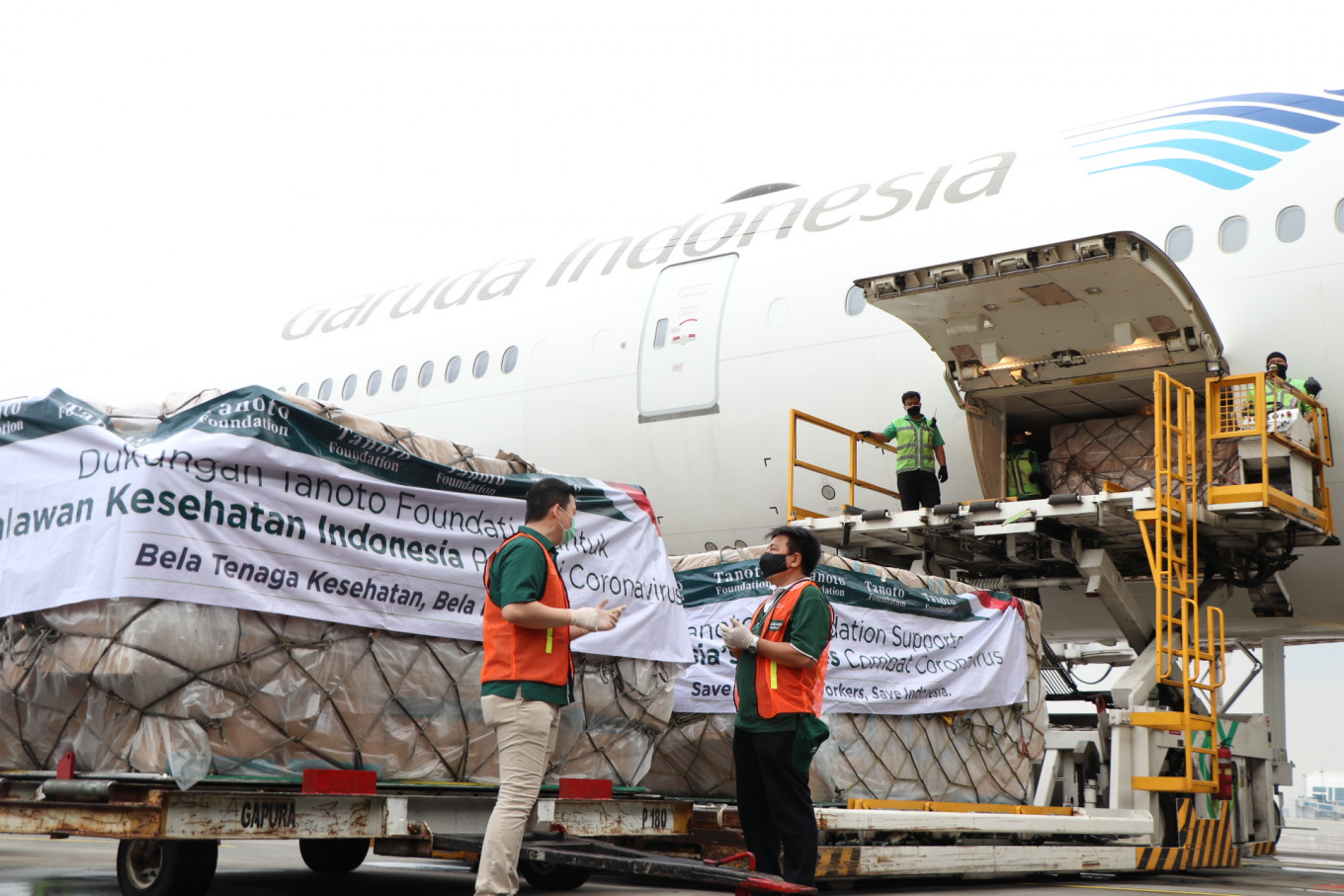Popular Reads
Top Results
Can't find what you're looking for?
View all search resultsPopular Reads
Top Results
Can't find what you're looking for?
View all search resultsGaruda books $120m net loss in Q1 as travel industry hit hard by COVID-19
Change text size
Gift Premium Articles
to Anyone
N
ational flag carrier Garuda Indonesia booked a net loss of US$120 million in the first quarter of this year, in stark contrast to profitability achieved last year, as the COVID-19 pandemic hit travel-related industries hard.
The publicly listed airline saw a 30 percent year-on-year slump in revenue to US$768.12 million in the first quarter from $1.1 billion in the same period last year. As a consequence, it booked a $120 million loss compared to $20.48 million profit in the January-March period of 2019.
“This industry is indeed a very tough industry. We are talking about a single-digit margin. So, when a disruption happens, the implication to our bottom line, cash-wise, is immediate and drastic,” Garuda Indonesia president director Irfan Setiaputra said on Wednesday during Inventure’s Indonesia Brand Forum 2020 webinar.
The company’s biggest revenue-generating operations, which is its scheduled airline services, booked 29.23 percent less income in the first quarter at $654.53 million, down from $924.93 million.
The company’s expenses, on the other hand, had not fallen as drastically. Its total operating expenses, which include costs for flight operations, maintenance and repairs, dropped by 9.92 percent to $945.71 million from $1.05 billion.
Irfan explained, that despite a slight improvement in airline traffic in recent weeks following the easing of travel restrictions, the number of passengers was still down 90 percent, while 70 percent of its aircraft remained grounded.
The coronavirus outbreak has devastated the aviation industry. The share of the world’s gross domestic product (GDP) spent on air transportation is expected to be halved in 2020 at 0.5 percent of the global GDP or $434 billion, according to an International Air Transport Association (IATA) report released on June 9.
As the number of airline passengers has plunged, airlines are forced into reducing flight routes and pursuing other measures to cut costs.
“Passenger revenue contributes more than 80 percent of Garuda Indonesia’s total revenue. With the decline in traffic, there needs to be a strategy to reduce the flight variable costs,” the company wrote in a statement published by Indonesia Stock Exchange (IDX) on May 29.
According to the statement, written in response to the local bourse’s request from May 12 for information regarding the impact of the pandemic, the company continued to reduce flight routes, both domestic and international.
Operations on international routes to the Middle East and China have been halted until further notice. Services on other international routes have been cut to around 60 percent to 80 percent against normal flight frequency.
In a revised statement the company issued on June 15, Garuda reported it had laid off 18 employees due to the pandemic, while 825 were furloughed as of March 31.
Meanwhile, Garuda Pilot Association (APG) chairperson Muzaeni told The Jakarta Post on June 2 that the airline had terminated the contracts of 180 pilots as a result of the cutbacks on flights.
In an annual general shareholders meeting on June 5, Garuda shareholders agreed to fully utilize its 2019 net profit of US$6.98 million as the company’s reserved funds. Last year was the first time the company managed to booked profits after booking losses for two consecutive years — with net losses of $231.16 million in 2018 and $216.28 million in 2017.
This year, however, analysts predict that COVID-19 will cause the company to suffer another net loss.
“We firmly believe that the sluggish figures for March 2020 are not the end but, rather, the beginning,” Mirae Asset Sekuritas Indonesia analysts Lee Young-jun wrote in a report published on May 18.
“The management is trying to focus on cargo business and chartered flights while increasing efficiencies and lowering costs. However, none of these are effective and easy to make up [for] the losses,” he added.
Going into the third quarter of the year, the postponement, or even cancellations, of haj fights will be the biggest risk factor for the airline, as these flights contributed about 5 percent to the company’s revenue in 2019, the analyst’s report says. On June 2, the Indonesian government officially announced that it had decided to cancel the 2020 haj.
The airline’s stock, traded on the IDX under the ticker code GIAA, has lost about half of its value since the start of the year and closed at Rp 244 per share on Friday. That compares with the benchmark Jakarta Composite Index’s 21 percent drop so far this year.
“Financially, 2020 will go down as the worst year in the history of aviation. On average, every day of this year will add US$230 million to industry losses,” IATA director general and CEO Alexandre de Juniac said in a statement published on June 9. The IATA reports that airlines are expected to lose $84.3 billion this year.










